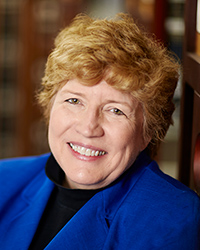Mary Beth Beazley

Which of your recent books or articles should I read?
It would have to be the most recent one: Writing for a Mind at Work: Appellate Advocacy and the Science of Reading, 54 Duq. L. Rev. 415 (2016). This article analyzes the impact of digital platforms on how we read and how we think. I guess I would also recommend Hiding in Plain Sight: “Conspicuous Type” Standards in Mandated Communication Statutes, 40 J. LEGIS. 1 (2014). That article talks about how legislatures mandate certain language, and even certain typefaces, in some legal documents like contracts and court orders. Unfortunately, they seem to be enacting these laws without a good understanding of how human beings actually read and use documents. It’s important to understand this behavior if you are a reader or a writer, or if you legislate or write opinions about reading and writing. For example, some court opinions that apply the “least sophisticated debtor” standard seem to assume a very sophisticated reader. We know how to write and design documents for maximum comprehension – documents from the Consumer Financial Protection Bureau are a great example – and courts and legislatures need to hold writers to a higher standard rather than to impose higher burdens on readers.
How does your research and scholarship influence your teaching and service and vice versa?
My teaching and scholarship really feed into each other. In my early years of teaching, I wrote a lot about teaching methods, because legal writing was undergoing a sea change. When I started teaching (in 1983), I taught mostly about using plain language and active voice, and not very much about research or analytical structure. Now things are almost reversed. And as I observed my own behavior as a reader, reading hundreds of pages each semester, I recognized some connections between reading and law. For example, I teach my students to exploit the “natural positions of emphasis” at the beginnings and endings of documents, sections, and paragraphs. Science shows that readers subconsciously pay more attention to items at the beginning of a unit of discourse (primacy effect) and at the end (recency effect). Any politician will tell you about the impact of primacy effect on voting, and I ended up writing an article about how ballot design needs to take into account what are essentially “reader” behaviors. Likewise, I recognized that there are certain ways in which I skipped around in documents when I was researching, and that behavior was different than the way I behaved when I was reading for pleasure or when I was grading papers. Talking to students about their own behavior as readers helps them understand why they have to structure their documents in certain ways; it’s a shock to some students that their readers are inattentive and impatient; they sometimes expect their readers to be “super-readers” instead of being as human as the students are. And again, this behavioral perspective led not only to my article on ballot design, but also to the conspicuous type article. Likewise, I noticed that I behave differently with hard-copy documents than I do with digital documents. That realization led me to read scientific articles about digital documents and cognitive function. And in turn, I now share that knowledge with my students when I talk to them about how they should read, and how they should write for others.
What is it about being a law school professor that inspires or motivates you?
Like many professors, I love the lightbulb moment – seeing my students understand a concept they had never understood before. I’m delighted that I’m teaching Fall 1Ls again, because I think there’s naturally a better chance for lightbulb moments with that group. And I just love the intricacies of legal writing. I enjoy introducing first-year students to the foundational concepts, and I enjoy teaching more sophisticated concepts to upper-level students. I look forward to meeting my new students – and reuniting with former students – every semester.